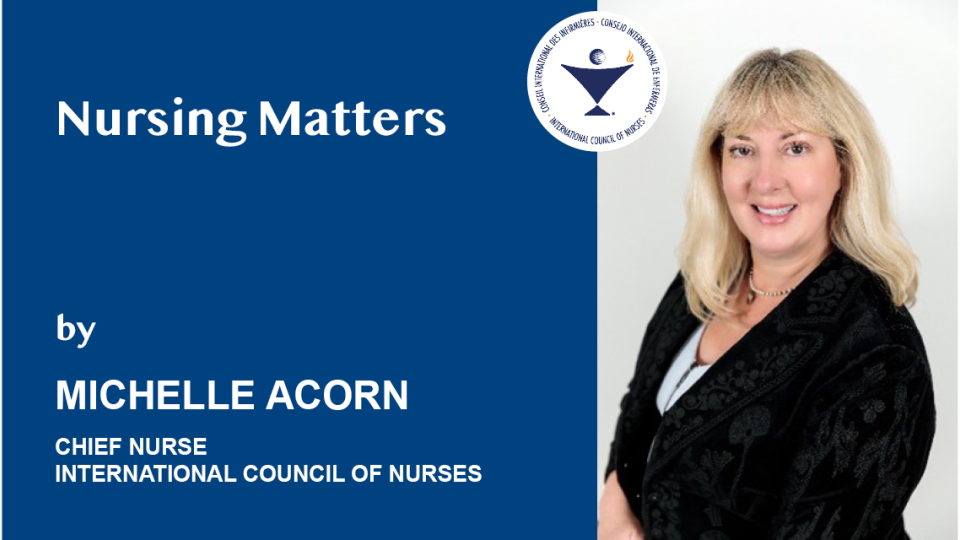Chief Nurse Blog: Nursing Matters July 2022

July’s blog is inspired after participating in the first workshop on Artificial Intelligence (AI) in Nursing, hosted by the Nursing and Artificial Intelligence Leadership (NAIL) Collaborative. There are a number of important resources that discuss various aspects and importance of digital healthcare. These include:
- The ICN’s International Classification for Nursing Practice (ICNP) provides an agreed set of terms that can be used to record observations and interventions of nurses around the world, providing a framework for sharing data about nursing and for comparing nursing practice across settings.
- The ICN Code of Ethics for Nurses (2021) specifically addresses:
- “1.4 Nurses hold in confidence personal information and respect the privacy, confidentiality and interests of patients in the lawful collection, use, access, transmission, storage and disclosure.
- 1.11 Nurses ensure the use of technology and scientific advances are compatible with the safety, dignity and rights of people. In the case of artificial intelligence devices such as care robots or drones, nurses ensure care remains person-centred and do not replace human relationships.”
- At the World Health Assembly, Dr. Tedros, Director General, highlighted the WHO five priorities (2022- 2027): 1) Promoting health for good health and well-being; 2) Providing health services by reorienting health systems towards primary health care as the foundation of universal health coverage; 3) Protecting health by strengthening global systems for health emergency preparedness, 4) Harnessing science, research, innovation, data, and digital technologies (the focus of this blog), and 5) Building a stronger WHO that delivers results in global health.
- The purpose of the WHO Global Strategy on Digital Health (2020-2025) is to promote healthy lives and well-being. Initiatives regionally to nationally must integrate financial, organisational, human and technical resources.
- The WHO Global Strategic Directions for Nursing and Midwifery (2021–2025) considerations for digital health and advancing AI related to the strategic priorities. Four examples of aligned policy priorities could target: 1) Competency-based education to enable nurses to understand how data is utilised to save time and lives, especially given that many non-nursing tasks in patients care occur; 2) Faculty professional development in the best pedagogical methods and technologies, with demonstrated clinical expertise and supporting resources are important; 3) Informatic nurse leadership skills development is required; 4) Establishing strong linkages for informatics with chief nurses and including nurses at all touch points are required from the bedside, classrooms, and in decision making forums.
- The Triad Statement (2021) affirmed the importance of adopting innovative approaches to strengthen the capacity of the health workforce team, accelerating telehealth services and digital education and learning, and increasing interprofessional collaboration, optimizing scoped of practice and upgrading the competencies of health workers, including nurses and midwives.
The value of AI technology as a transformational tool for nurses to lead and support advancing quality care and improving patient and health work forces locally to globally warrants consideration. Ethical and safe design, implementation, utilisation, monitoring and evaluation in clinical, academic, leadership and quality improvement practices are essential interprofessionally.
Nurses must be involved and recognised in all stages of digital and AI creation for integration across systems including procurement, development, design, implementation, analysi, and monitoring. Partnerships with academia, businesses and technology teams are needed. Integrated touchpoints and workflows with Executive Chief Nurses, Professional Practice Leaders, direct care nurses, patients, caregivers, students and faculty are needed. The mitigation of biases and unintended consequences by leveraging nursing expertise for social justice, population and professional health equity digitally and beyond is paramount.
Nurses’ digital health practices and digital literacy are important. Continuing professional development across the nursing career trajectory is warranted
Digitally yours in nursing and health,
Michelle
ICN Chief Nurse, Dr. Michelle Acorn, DNP, NP PHC/Adult, FCAN, FAAN, CGNC